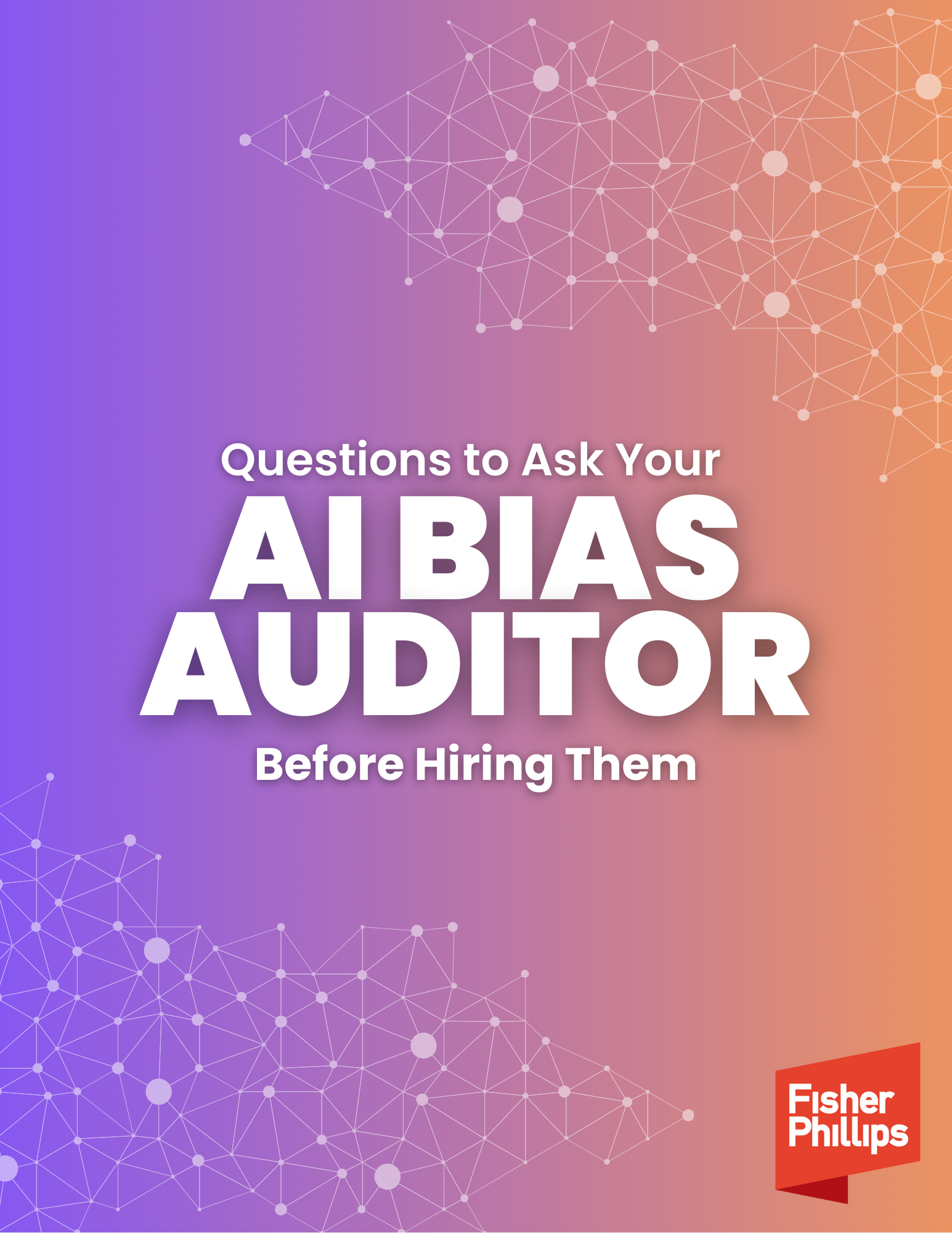You are increasingly using AI to help shape your decisions about who gets hired, promoted, or even approved for a loan. But if your algorithm results in bias, your organization could face lawsuits, regulatory scrutiny, and reputational damage. That’s why businesses are retaining vendors to conduct AI bias audits: structured evaluations of whether systems are fair across protected groups. But here’s the challenge: not every “bias auditor” is equally qualified. To avoid wasted effort or an audit that won’t withstand scrutiny, you should carefully vet potential providers. Below are the key categories of questions you should ask when evaluating AI bias auditors.
👉 Click here to download our full AI Bias Auditor Questionnaire for a deeper dive.
Why You Should Conduct an AI Bias Audit
In some places, bias audits aren’t optional. New York City’s Local Law 144 requires annual independent audits for automated employment decision tools (AEDTs), for example, and other jurisdictions will be moving in a similar direction. Even where audits aren’t mandated, courts have made clear that disparate impact discrimination – when a neutral policy disproportionately affects protected groups – remains unlawful under federal civil rights law.
Skipping an audit can also create litigation risk. Some state regulations are moving towards a system that would allow plaintiffs’ lawyers to argue that a company’s failure to conduct a bias audit shows negligence or disregard for known risks of discrimination. In other words, conducting a bias audit is quickly becoming a baseline expectation. Once you’ve established the need for an audit, the next critical question is: who should perform it?
|
Why Work With an External Auditor While some organizations attempt to self-audit, most choose to hire outside experts. A third-party auditor can provide:
|
Background and Expertise
You need to know whether your auditor truly understands bias, disparate impact, and the legal landscape. An impressive technical résumé alone isn’t enough – your provider should combine statistical know-how with regulatory awareness.
Sample Questions:
- What expertise does your team have in disparate impact and bias mitigation?
- Which AI-related laws and regulations have you worked with, and how familiar are you with their requirements?
- Have you adjusted your methodologies to account for pending legislation, such as CPRA rules or Illinois’ 2026 AI law?
- Can you share examples of similar projects you’ve completed, including key outcomes?
Methodologies, Frameworks, and Tools
Bias audits are only as strong as the methods behind them. You want an auditor who can clearly explain their approach and who balances fairness with accuracy. If their methods are vague, your audit may not hold up under scrutiny.
Sample Questions:
- What methodologies do you use to evaluate AI fairness?
- How do you measure the trade-offs between accuracy and fairness?
- What tools – internal or external – do you use for bias detection?
- How do you address small sample sizes or imbalanced datasets when testing for bias?
- Does your methodology test for all legally protected categories, not just those covered by narrow state or local laws like NYC Local Law 144?
Data Security and Privacy
AI bias audits often involve sensitive personal data, including demographic information. That means auditors must meet the same security standards you’d expect from any vendor handling critical HR or customer data. Even if your auditor has particular security certification such as ISO 27001 or SOC 2, that certification is only a snapshot in time, does not paint the current picture of the vendor’s cybersecurity measures, and may have been limited in scope. Below are some sample questions as a starting point for a more thorough review of the vendor’s security measures.
Sample Questions:
- What risk mitigation strategies do you use when handling sensitive personal information?
- Do you follow security certifications such as ISO 27001 or SOC 2?
- Who has access to the data during your analysis?
- What is your data retention policy after an audit is complete?
- Do you have a breach response plan in place?
Post-Audit Support
An audit report is just the beginning. The real value comes from how you address the findings and whether the auditor will help you navigate that process. Look for providers who stick with you beyond the initial report.
Sample Questions:
- What kind of post-audit support do you offer?
- How do you help organizations overcome resistance to implementing bias mitigation measures?
- Do you provide tools or metrics to measure the effectiveness of changes over time?
Industry and Regulatory Experience
Every industry has its own risks, and federal contractors may face additional compliance obligations. You’ll want to know whether an auditor understands your specific operating environment.
Sample Questions:
- Have you conducted bias audits or validation studies for businesses in our industry?
- Do you have experience working with federal contractors? (if applicable)
- Are you familiar with the Uniform Guidelines on Employee Selection Procedures (UGESP) and related OFCCP requirements? (if applicable)
Key Takeaways for Employers
- Don’t settle for box-checking. A poor-quality audit could do more harm than good.
- Vet for both legal and technical expertise. True fairness requires more than math.
- Demand transparency and follow-through. You’ll need to stand behind the audit if questions arise.
👉 To make the process easier, we’ve created a comprehensive questionnaire you can use when vetting AI bias auditors. Download it here.
Conclusion
For support in selection an AI bias audit vendor, please contact your Fisher Phillips attorney, the authors of this Insight, or any member of our Artificial Intelligence team. Make sure you are subscribed to Fisher Phillips’ Insight System to receive the most up-to-date information directly to your inbox.




